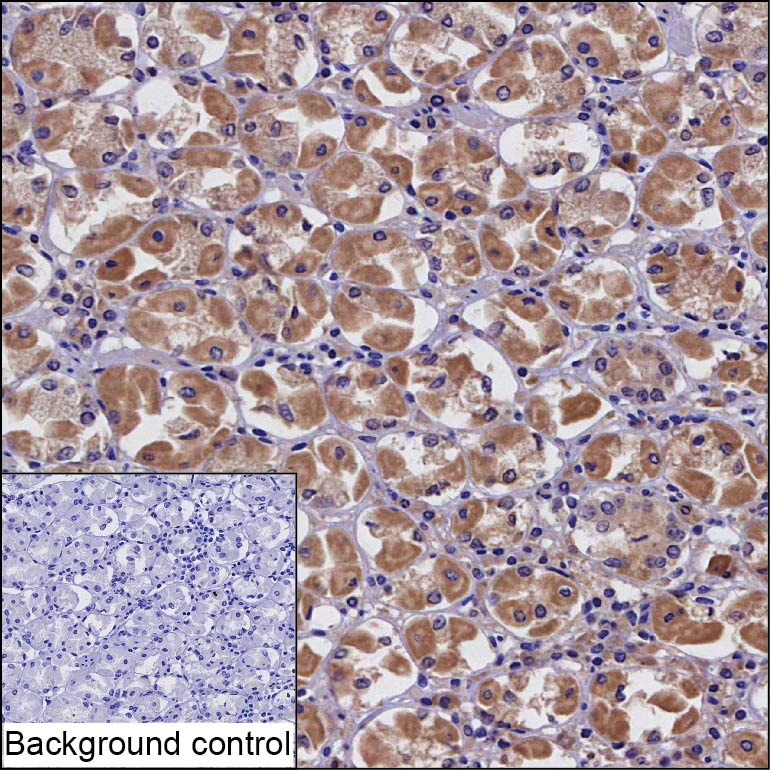
| WB | 咨询技术 | Human,Mouse,Rat |
| IF | 咨询技术 | Human,Mouse,Rat |
| IHC | 1/20-1/100 | Human,Mouse,Rat |
| ICC | 技术咨询 | Human,Mouse,Rat |
| FCM | 咨询技术 | Human,Mouse,Rat |
| Elisa | 咨询技术 | Human,Mouse,Rat |
| Host/Isotype | Mouse IgG2b |
| Antibody Type | Primary antibody |
| Storage | Store at 4°C short term. Aliquot and store at -20°C long term. Avoid freeze/thaw cycles. |
| Species Reactivity | Human |
| Immunogen | Purified recombinant fragment of human ARF6 |
| Formulation | Purified antibody in PBS with 0.05% sodium azide |
+ +
以下是3篇关于ARF6抗体的参考文献及其摘要概括:
1. **"ARF6 regulates endocytic recycling and actin cytoskeleton remodeling during cell migration"**
*Authors: D'Souza-Schorey C, Chavrier P*
摘要:研究通过ARF6抗体检测发现,ARF6通过调控内吞循环和肌动蛋白重组,促进肿瘤细胞的侵袭性迁移。
2. **"ARF6 controls amyloid precursor protein trafficking and amyloid-β generation"**
*Authors: Sannerud R, et al.*
摘要:利用ARF6抗体进行免疫沉淀实验,揭示ARF6在阿尔茨海默病中调控淀粉样前体蛋白运输及β淀粉样蛋白生成的分子机制。
3. **"ARF6 promotes hepatocellular carcinoma metastasis through tumor-derived exosomes"**
*Authors: Li Y, et al.*
摘要:通过ARF6抗体阻断实验,证明ARF6通过外泌体介导的肿瘤微环境重塑,驱动肝癌转移。
4. **"ARF6 modulates synaptic vesicle trafficking and neurotransmitter release"**
*Authors: Morishita H, et al.*
摘要:研究使用ARF6抗体进行免疫荧光定位,发现ARF6在神经元突触小泡运输和神经递质释放中的关键调控作用。
以上文献均涉及ARF6抗体的实验应用,涵盖细胞迁移、神经退行性疾病、癌症转移及神经生物学等领域。
The ADP-ribosylation factor 6 (ARF6) antibody is a key tool in studying the function and regulation of ARF6. a small GTP-binding protein belonging to the ARF family. ARF6 plays critical roles in membrane trafficking, cytoskeletal reorganization, and cellular signaling. It cycles between an active GTP-bound state and an inactive GDP-bound state, regulating processes like endocytosis, exocytosis, and cell migration. Dysregulation of ARF6 is implicated in cancer metastasis, neurological disorders, and infectious diseases.
ARF6 antibodies are widely used in research to detect ARF6 expression, localization, and activation status in various biological systems. These antibodies enable techniques such as Western blotting, immunofluorescence, and immunoprecipitation, helping to elucidate ARF6's interaction partners and downstream pathways. Monoclonal and polyclonal antibodies targeting specific epitopes or activation states (e.g., GTP-bound ARF6) are available, allowing precise mechanistic studies. Validation of ARF6 antibodies is crucial, as cross-reactivity with other ARF isoforms (e.g., ARF1 or ARF3) may occur. Researchers often verify specificity using knockout cell lines or siRNA-mediated ARF6 knockdown.
As ARF6 gains attention in therapeutic targeting, its antibodies remain essential for exploring its pathophysiological roles and potential clinical applications.
×